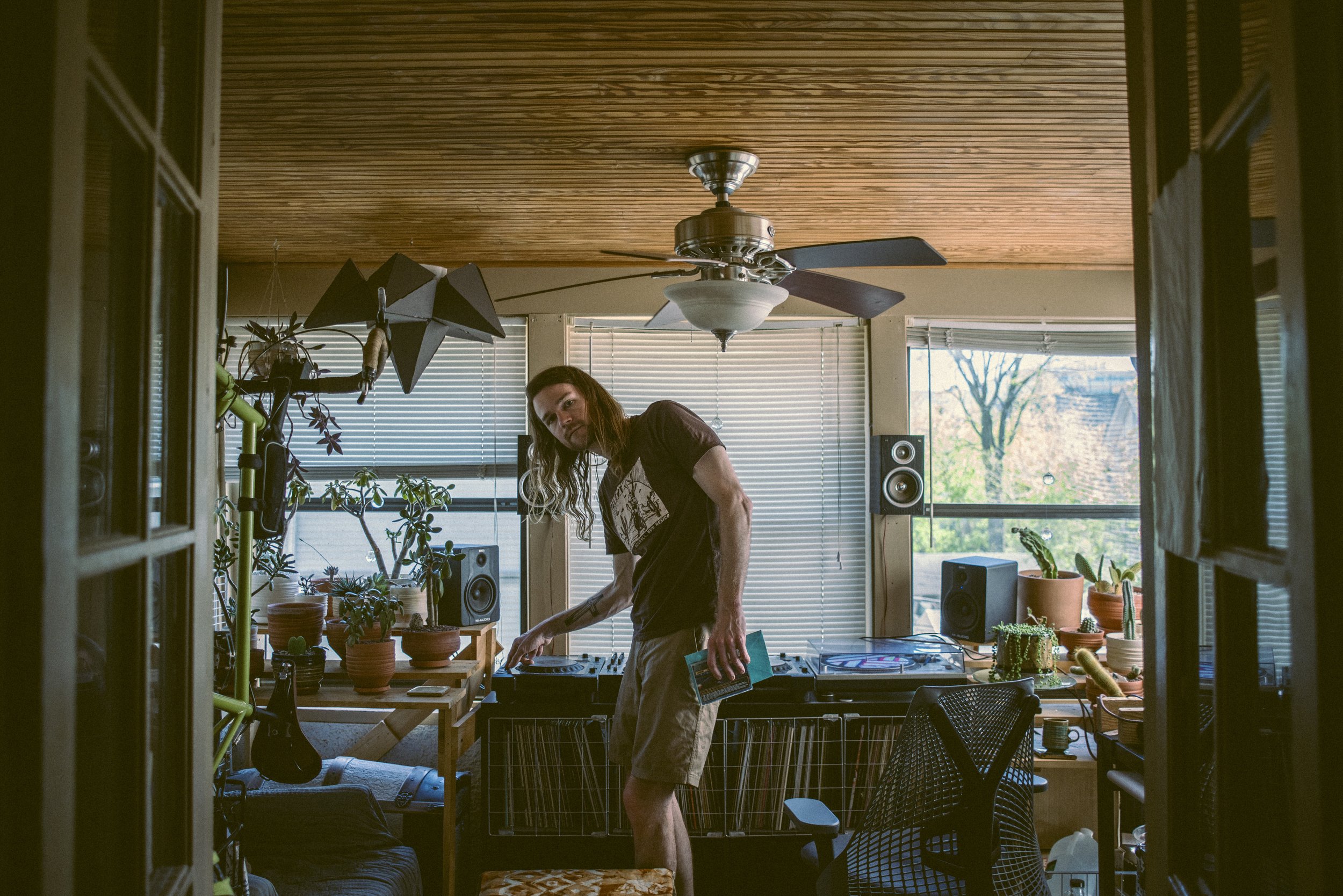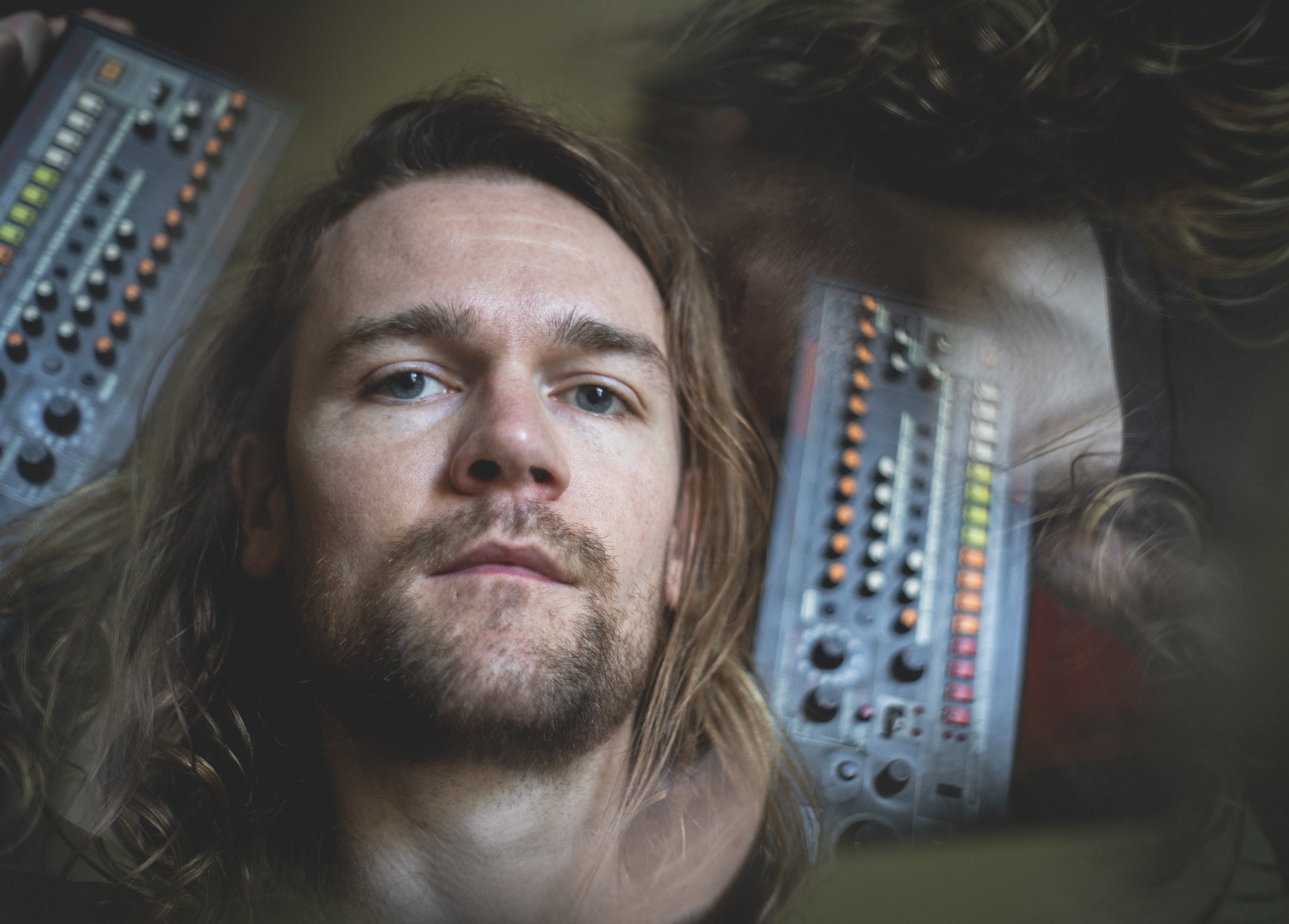flyover 8: private guy
We recently sat down with Kajunga Records co-founder Private Guy to talk about his flyover set. Some quotes were edited for clarity.
Jacob: I won't do what I did to Cameron when I interviewed him and ask about how being vegan influences your approach to DJing. [Pause for laughs]. We can just skip that.
The first thing I noticed about your mix is that it’s straight-up techno. I don't think I’ve heard that from you before. Why did you take it in that direction?
Alex: I've definitely always had an interest in techno, but it wasn't until I moved to Minneapolis in 2013 that I started getting more familiar with it. It's a genre that I've collected, [though] not as predominantly as house, and [I] haven't given myself too many opportunities to DJ it…this is my first techno mix where I sat down and made a mix for the studio. It was a fun process to think about [how] Minneapolis is such a techno city [with] its own sound. I wanted to embrace that.
Jacob: I think it comes through in the mix. You have tracks by DVS1 and Heckadecimal on there, and there's a narrative woven throughout, even if not every artist on the mix is from Minneapolis.
Cameron: I think we're at this point with electronic music in general where just about everything is appreciated in some way, and we're all listening to such a huge, broad variety of [music]. I get super scatter-brained. How do you find your sound? And not just absorb the sound of whatever you're listening to that day?
Alex: I think my production is really informative. What I like to make, I often like to play. Over the last year or two, I've [made] a lot more techno, and the techno that I like to make is atonal, kind of deep…tone-derived melody in a sense, but dissonant sort of stuff…instead of industrial noise. You can hear it in the mix...it's pretty fucking deep. That sort of sound is definitely something that I'd love to make, and the production world is where I currently find myself more than in the DJ world.
Jacob: How would you describe your last EP? [Liquid Sun, Kajunga Records]
Alex: That's old-school midwest house. It has those downtempo tracks that have more of a deep Detroit mystery to them. Just like really psychedelic, effects-driven…the old-school hardware sort of sound.
Jacob: Whether it's techno or house, what brought you to DJing and dance music?
Alex: I've always had an interest in that style of music, whether I realized it or not. When I was six, I saw Mortal Kombat against my parents' wishes, and I was obsessed with the theme by Lords of Acid for years. I asked for that tape for Christmas, which I knew I wasn't going to get. I think my parents got me a [tape by a] Christian artist or something.
Also, “Can't Get You Out of My Head.” I really loved that track. And “Barbie Girl” by Aqua, so stuff like that [makes me] think I’ve always had an affinity for [dance music].
And then I discovered more in college with Justice and Daft Punk…French house really got me into it. I was lucky enough to have friends who were DJs, like [my] label-mate Jordan [Berndt]. He had been DJing since high school, [where] he was a year ahead of me. In college, we started hanging out more…he introduced me to his friends, DJs [who played] psytrance festivals. Eventually, we got more into underground dance music, and [were] invited to Movement in Detroit by another high school friend of ours, and the rest is history.
I think knowing people who were pressing their own records early introduced me to the right mindset for underground dance music…putting in the work and creating the community…it's really infectious when you see that.
Jacob: Who was pressing their own records?
Alex: Michael Gisi and Malcolm MacLachlan, who are Segv and Appian, respectively. They were running Sly Fox Records…I think Malcolm grew up in or near Detroit and Gisi met him in college at Ann Arbor, and just being so close to Detroit, having an electronic music scene there…I think it's kind of built into the culture of that city to do it yourself. It feels normalized, which is so cool and weird.
So Jordan and Michael Gisi were DJing in high school, and they threw a rave at Michael's parent’s house in the garage, and were just playing ravey, like Tiësto and Benny Benassi.
Cameron: This is in Grand Forks, [North Dakota,] right?
Alex: Yeah. So I was like 16 and they were 17 or 18. After they graduated, I didn't really do much, cause [in] Grand Forks…you’re just not exposed to that [muisic] at all. Even what I was exposed to was so…periphery…like seeing a random concert and then never hearing about that band again…it wasn't until later that I discovered dance music.
Jacob: You're not counting Tiësto as dance music?
Alex: [Laughing] Well, when I discovered that I liked dance music.
Jacob: When did y'all permanently relocate?
Alex: To the Twin Cities? That was in 2012-13. Jordan had moved down here, Ryan [Ryote] was living in Florida, and Matt [Cloudy Kid], was living in Stillwater, [Minnesota].
Jordan [and I] lived together, and then a year later, Matt and Ryan also moved into the house with us. Right around that time is when we started talking. [We asked ourselves] “do we want to do this ourselves and start making our own music and pressing our own records?”
I had an off-year after college, and it was just working. [I spent that] year exploring Ableton and what it can do. Jordan sparked [an interest in] DJing and producing, he was a year or two ahead of me with a lot of that…eventually I found interest [in DJing] myself too. That was at the first pre-Kajunga party house…on Van Buren and Western in Saint Paul…[that’s] where we formulated [the label].
By the Spring of 2014, we had lived there for about a year. Ry had moved back from Florida and was hanging with us a bunch. Matt was doing the same thing. They were going to Detroit, and we made a sampler of all of our early, early tracks. They just handed it out in Detroit to people. So there's a Kajunga Spring Sampler 2014 out there somewhere with printed stickers, CDs, and really cheap jewel cases.
After that, we moved into [DJ] Hell House. It was me, Matt, Jordan, Ryan, and Mitch. Mitch was our outlier friend. He's the one (who wasn't a DJ) who named DJ Hell House, which was, like, not a fond name from him I think. But he was extremely patient with us…I'm grateful that he put up with all of our shenanigans through that year.
That was the year when we were all like, “OK. Let's fucking do it.” For the whole year, it was [us] having critiques and bringing [our] tracks to the table, and basically, all of us saying “Yeah, they're not good enough yet.” I went through a lot of tracks before I found one where I learned the process well enough to understand what goes into completing a house track for me. That summer, we got the [first] record together and had a record release later that fall.
Jacob: Can you tell me about your experience living in that communal artistic setting? As far as the creative output is concerned, were there any tensions?
Alex: Creatively, it was amazing. Having even one of your creative fellows working alongside you in a studio space or a house is such a benefit.
I wouldn't say there was a lot of creative tension, cause we're all pretty open. We all realize that you really need critique, you need criticism of your work. We all know that we're going to be honest with each other and we ultimately have the same goal in mind. I really, really look forward to sharing tracks with the Kajunga boys and having them point out what I'm doing wrong, or what exactly they like about a track. Their feedback is so beneficial.
Jacob: I don't think you can get to a point where you have music ready to be pressed to wax without critique.
Alex: It's so necessary. It's hard. I learned that in art school. I always kept the mindset that criticism is good…you really need someone to tell you when your work is bad, especially someone [who] understands it.
Cameron: That was my experience in art school as well. It’s super important to have that peer critique from peers [who] you actually respect...
Alex: Critique creates language that helps make the music-making process easier. You invent language that takes your concepts [higher].
Jacob: Where'd you get your tracks?
Alex: These were all digital. I haven't been collecting wax too much for the last few years. I'd like to get more into it, but I just haven't been allocating the finances.
Jacob: It’s expensive.
Alex: I’ll buy records, maybe one a month or so right now, something that pops up that I really like. I shop predominantly on Bandcamp. When I'm searching for new music, I'll look all over the place. Whether it's Bandcamp, Beatport, Juno, Amazon…there’s shit you can't find anywhere but Amazon. It's fucking weird.
Jacob: That's, like, if you see something on Discogs that catches your eye, you might scour the internet for it…
Alex: I don't do that because I want to get nice, quality files right away. And Bandcamp is such an easy direct-to-artist. I feel good about it, and I get all the assets with the track, too. The track isn't called “www.whatever…”
Jacob: “YouTubeToMP3converter.com”
Alex: Yeah. It makes the music collecting process feel a little bit more immersive and kind of clean. That, in turn, helps inform my selection process… I wish I could memorize names and albums and labels and stuff really well, and I can do okay If I’m really actively like “Calamari. Oyster. Cult. Calamari. Oyster. Cult.”
Cameron: I think it's “Kalahari.”
Alex: [Laughing] Fuck! See? That's what I mean…having a visual [cue] of artwork along with it [helps].
Cameron: I only remember visually; I don't remember a single fucking track name. It’s just, like, “the purple one.”
Alex: Sometimes it's a weird name, like “Voxator,” and I'm like, I don't know what that is.
Jacob: So what I'm hearing is that [atonal techno] is, musically, the direction that you find yourself moving towards right now?
Alex: Yeah. I tend to just…let come out what wants to come out. Lately, it's just been techno. I'll do some house here and there, some more uplifting stuff, [but] techno [has] taken over. It's hard not to [let it], living in Minneapolis. There’s such a vibrant and distinct energy here. It’s the tonality. You hear it with Lonefront and Autokinetic, where it's so deep, but it's a primal, raw energy that speaks to my inner caveman. It just makes me want to dance and watch the shadows on the cave wall.
Tracklist:
Adam Arthur - The Bard’s Tale [Interdimensional Transmissions, 2021]
Arkajo - Tape 15 [Brotherhood Sound System, 2017]
K-HAND - Intuition [Acacia Records, 2015]
Pattrn - Stevia [TGP, 2021]
Zadig - The Mysterious Theory of Kelvin [Syncrophone Recordings, 2016]
Refracted - The View From Cal Companyo [Bitta, 2022]
Marco Shuttle - Danza Cinetica [Spazio Disponibile, 2016]
Keplrr - Convection (Desert Sound Colony Remix) [Control Freak, 2022]
Collin Crowe - Never Gonna Die [Lost Soul Enterprises, 2017]
Pascal Hetzel - Incognizance [Eye Teeth, 2018]
DVS1 - Delta Wave [Axis, 2020]
Rene Wise - Jungle House [Enemy Records, 2022]
Dold - Yalla [Arsenik Records, 2015]
Gianluca Caiati - Surrender (Substance Remix) [K S R, 2022]
Bidoben - Soft Milieu [Truncate, 2022]
Heckadecimal - Acid Tenders [Kajunga Records, 2020]
Oscean - Austraal [Tresor, 2022]
KGIV - Regulatory Capture [Eye Teeth, 2020]
Lloyd Stellar - Mars Underground [Specimen, 2020]
ÖLF - Onkalo [Shoganai Records, 2019]
Follow Private Guy on SoundCloud







